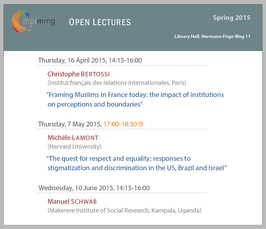"The Radical Ambiguities of Diversity Politics in a Global City: Lessons from London"
Open Lectures Spring 2015
- Date: Mar 5, 2015
- Time: 02:15 PM - 04:00 PM (Local Time Germany)
- Speaker: Mike Raco (Bartlett School of Planning, University College London, UK)
- Mike Raco is Professor of Urban Governance and Development at the Bartlett School of Planning, University College London.
- Location: MPI-MMG, Hermann-Föge-Weg 11, Göttingen
- Room: Library Hall

For more details please contact buethe(at)mmg.mpg.de.
This lecture explores dominant narratives of diversity planning in one of Europe’s most diverse and globally-oriented cities, London. We draw on an on-going cross-national, collaborative research project, named DIVERCITIES, that is exploring the ways in which diversity is conceptualised in urban policy frameworks and the implications these conceptualisations have for citizens and policy priorities. The presentation focuses on the London case and argues that diversity narratives are underpinned by radical ambiguities. On the one hand diversity is represented in pragmatic, consensual, and celebratory terms. A pro-diversity approach is justified as being both morally progressive and grounded in a hard-headed understanding of the needs of competitive, successful businesses and modern urban economies. Under prevailing conditions of contemporary global capitalism labour market-building and the attraction of ‘talented’ individuals represents an essential element in the city’s wider strategy for development. It is a discourse that seeks to marginalise broader concerns and conflicts over the impacts of population growth and directs attention towards more consensual representations such as ‘vibrancy’, global city ‘branding’, and enhanced economic performance. However, at the same time this celebration of diversity helps to deflect attention away from more difficult policy questions concerning the socio-economic impacts of global models of economic growth and the changes these bring to the city’s built environments. There is little discussion of class differences and how dominant models of capitalist growth are generating heightened inequality in (and beyond) the city. Moreover, diversity narratives have helped policy-makers to individualise and atomise explanations for the persistence or enhancement of inequality and discrimination. The lecture explores and analyses these ambiguities and their implications for planning narratives and practices in London and beyond.